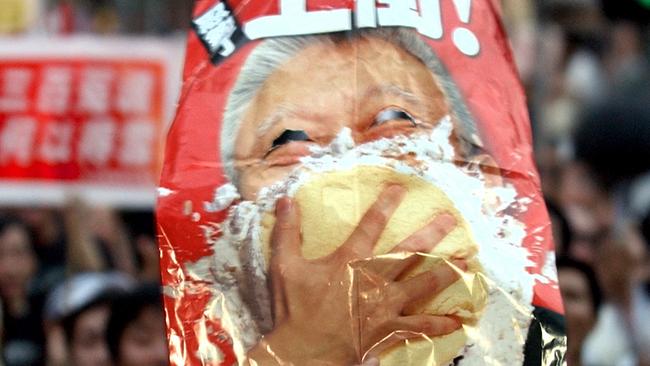
Having lived in the vibrant Manhattanesque, Blade Runner, East meets West city for three years, part journalist, part “tai tai” banker’s wife, I joined The Australian’s then China correspondent on a visit to the start of a march in Victoria Park against the government’s proposals to introduce tough new security laws.
Under Article 23 of Hong Kong’s mini-constitution, called the Basic Law, which came into force after the July 1, 1997, handover from Britain to China, the government of Hong Kong was required to enact its own national security law banning “treason, sedition and subversion” against the Chinese government.
Six years after the handover, with global fears of the tanks rolling in from China subsiding, it was looking like nothing was going to change and the unique “one country, two systems” approach that had been hammered out allowing Hong Kong to remain independent appeared to be working remarkably well.
But appearances, when it comes to dealing with China, can be deceptive. The then government, led by chief executive Tung Chee-hwa, announced plans introduce legislation to enact Article 23 with strict security provisions which could severely reduce the rights and liberties of the citizens of Hong Kong.
While expats enjoyed Hong Kong’s unique lifestyle and its Western-style freedoms, the normally ultra-law-abiding citizens of the city knew exactly what this meant and were determined to stop it. While the proposals were ostensibly being introduced at the behest of Tung’s apparently independent administration, the move was widely seeing as the government, particularly security secretary Regina Ip, trying to carry out Beijing’s will to introduce new controls in the name of “security”.
Having decided to drop down to see the action, I found myself swept up in a peaceful march of more than 500,000 people from Victoria Park to Central.
As we walked along, the ranks of the marchers swelled with more and more ordinary Hong Kongers — middle-class people with their families, young couples.
A week later, one of the mothers from my son’s school, a Hong Konger I had worked with at the school fete, emailed me to signal her quiet appreciation that I had been part of the march.
Public anger was so strong that the government withdrew the proposals to enact Article 23, and Ip resigned and went to the US to do a masters degree, dropping out of sight.
Hong Kong, we all wanted to believe, would remain “Asia’s World City”, independent from China in a unique arrangement which would defy all doomsayers.
Fast-forward to early last year, when the government proposed to introduce new laws allowing extradition from Hong Kong to China for anyone accused of violating Chinese law.
The citizens of Hong Kong again immediately knew what that meant and took to the streets in demonstrations in their hundreds of thousands along that same Victoria Park to Central route and other places around the city.
What followed was a year of bitter demonstrations for most of 2019, as Hong Kong’s youth fought the proposals to a standstill with Tung’s successor, Carrie Lam, finally agreeing to withdraw that proposed bill. But the demonstrations have spilled over into widespread unrest based on fears of increasing Chinese interference.
Meanwhile, Beijing’s anger that Lam’s government was unable to restore peace to the streets continued to simmer. But China knows how to play a long game.
Angry at the perceived lack of action by Lam’s government, Beijing quietly installed two new hard men to manage Hong Kong affairs in the wake of the demonstrations.
On Friday, the Chinese government introduced its own bill to the National People’s Congress in Beijing to enact Article 23, potentially in weeks. To the shock of many, it appears that Beijing may decide to literally take the law into its own hands and amend the Basic Law, which successive governments in Hong Kong have failed to do for fear of the public reaction.
This is technically allowable but represents a massive step forward in terms of Beijing’s interference in Hong Kong’s affairs.
Looking back, the march of July 2003 was a relatively innocent time. But if Beijing does move ahead with its own Article 23, Hong Kong as we know it can never be the same.
Glenda Korporaal is a former China correspondent for The Australian




In 2003 I accidentally ended up participating in one of the largest demonstrations in the history of Hong Kong at the time.